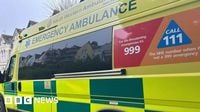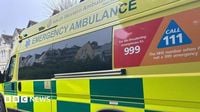Two ambulance service workers from the South Western Ambulance Service NHS Foundation Trust (SWASFT) have been arrested in connection with the deaths of six adults in and around Wiltshire, marking a dramatic turn in a major investigation that has gripped the local community. The probe, which began in 2023, has seen months of meticulous police work, internal scrutiny, and mounting public concern about the safety and oversight of emergency medical care in the region.
According to Wiltshire Police, the investigation was launched following an initial report in 2023. Detective Chief Inspector Phil Walker, who is leading the inquiry, said, "We can confirm that a major investigation is underway relating to several adult deaths in and around Wiltshire. This investigation has been ongoing since an initial report was made to Wiltshire Police in 2023 and detailed enquiries have been undertaken since to ascertain the facts."
The first arrest came in June 2024, when a man in his 30s from West Wiltshire was detained on suspicion of six counts of gross negligence manslaughter and four counts of ill-treatment or wilful neglect by a care worker. In March this year, a 59-year-old woman was also arrested on suspicion of gross negligence manslaughter. Both individuals were employed by SWASFT and have since been released on bail while the investigation continues, as reported by The Independent and BBC News.
Gross negligence manslaughter is a serious offense in the UK, requiring proof of a breach of an existing duty of care that results in a serious and obvious risk of death, according to the Crown Prosecution Service. The charges facing the two ambulance workers reflect the gravity of the allegations and the potential consequences for the trust and its patients.
In response to the situation, SWASFT acted swiftly. A spokesperson for the trust stated, "As soon as the trust became aware of any concerns, we immediately initiated an internal investigation which resulted in a prompt police referral, and we have been working closely with them as part of the ongoing investigation. Two members of staff were suspended. The suspension of the two members of staff meant that they were immediately relieved of all duties, including the treatment of patients." The trust emphasized that the suspension was immediate and comprehensive, aiming to safeguard patient welfare during the ongoing inquiry.
One of the suspended individuals is no longer employed by the trust. The spokesperson continued, "We would like to reassure people that this is an isolated situation and there is no ongoing risk to patients. Please continue to call 999 in a life-threatening emergency." The trust has refrained from making further comments due to the sensitive and ongoing nature of the investigation.
Detective Chief Inspector Walker echoed the trust’s focus on the affected families, stating, "Our focus is on supporting the families and loved ones of those who have died, and we would ask the media to respect their privacy at this time." The police have been careful to balance the need for public information with the privacy and dignity of the bereaved.
The Care Quality Commission (CQC), the independent regulator of health and social care in England, has confirmed its awareness of the police investigation but is not currently involved. The trust’s most recent inspection by the CQC was in 2022, and the results painted a largely positive picture of the organization’s performance. The inspection rated SWASFT as "good" overall, with "outstanding" marks for caring and "good" ratings for effectiveness, responsiveness, and leadership. However, the watchdog noted that safety remained an area requiring improvement, and emergency and urgent care services were also flagged for needing further enhancement.
The CQC’s 2022 report stated, "Our rating of the trust improved. We rated it as good overall because: Caring was rated as outstanding. Effective, responsive and well-led were rated as good. Both effective and well-led improved from requires improvement at our 2016 inspection with responsive remaining as good. Well-led at trust level was rated as good. However, safe remained as requires improvement." This mixed assessment highlights the complexities of delivering emergency care at scale and the constant pressure to maintain high standards across all domains.
The news of the arrests and the ongoing investigation has inevitably shaken public confidence in the ambulance service, even as officials work to reassure the community. The trust has stressed that there is "no ongoing risk to patients" and that the situation is "isolated," urging people not to hesitate in seeking emergency help when needed. "Please continue to call 999 in a life-threatening emergency," the trust’s spokesperson reiterated, seeking to prevent a chilling effect on those in need of urgent medical attention.
The local community has responded with a mix of shock, concern, and calls for transparency. While the details of the alleged incidents remain closely guarded due to the legal proceedings, the fact that two trusted healthcare workers stand accused of such grave offenses has prompted soul-searching and debate about oversight, training, and accountability within the NHS and the ambulance service.
Experts note that cases of gross negligence manslaughter involving healthcare professionals are rare but not unprecedented. The legal threshold is high, and convictions typically require clear evidence of a reckless disregard for patient safety. The ongoing investigation will likely scrutinize protocols, record-keeping, and decision-making processes within SWASFT, as well as the actions of the individuals involved.
Meanwhile, the trust’s leadership faces the daunting task of restoring public trust and ensuring that all staff adhere to the highest standards of care. The suspension and subsequent departure of one of the workers demonstrate a commitment to swift action, but the broader implications for staff morale and operational culture remain to be seen.
For now, the families of the deceased are at the center of the investigation, receiving support from both police and the trust. As Detective Chief Inspector Walker put it, "Our focus is on supporting the families and loved ones of those who have died." The coming months will likely bring further developments as the investigation progresses and the legal process unfolds.
As Wiltshire and the wider region await answers, the case serves as a sobering reminder of the responsibilities entrusted to emergency medical workers and the vital importance of vigilance, transparency, and compassion in the delivery of care.



